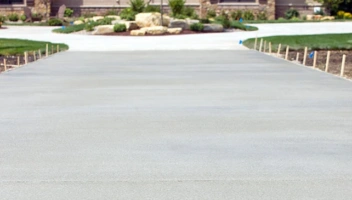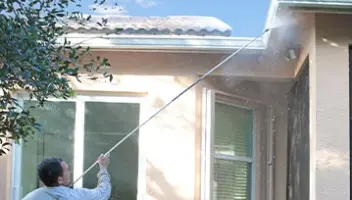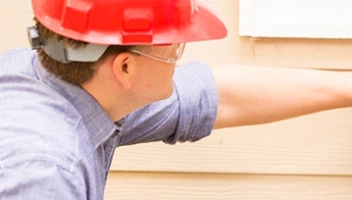3 Mistakes to Avoid When you Own a Pool

Warm weather and sunny days often means more time lounging by the pool, however, we realize with that comes the burden of swimming pool maintenance. This summer, LeafFilter is encouraging Canadians to Take Back Saturday – eliminating bothersome chores and making life easier around the home. In an effort to help you spend less time on your swimming pool maintenance, avoid these 3 common mistakes that pool owners make.
Not Balancing your Swimming Pool Chemicals
- A regular pool maintenance routine is crucial for functional pools and equipment. Without correct chemical levels, a variety of different issues can occur:
- Ecosystems & Growth: Bacteria and fungus can create their own little ecosystems that can quickly overtake a pool. These organisms can cause a number of different illnesses.
- Super-chlorination: Over-chlorination, also known as super-chlorination, can shock a pool’s ecosystem, but also create skin irritants such as redness, rashes, and respiratory issues.
- Skin Irritants: Chemical imbalances can lead to an uncomfortable swim. Skin irritation can occur when your pool chemicals are not at the correct levels.
- Perpetual Imbalance: Ongoing chemical imbalances can corrode your equipment.
- Pool Party: Pool owners sometimes forget that a higher bather load changes everything. Failing to add some shock after a party can lead to an explosion of algae.
How can you combat it?
The two most important parts of a healthy pool are sanitization and chemical balances. Whether you are a new pool owner or an expert, it is important to review the contributing factors to a healthy pool.
The most efficient way to sanitize your pool and keep swimmers safe is with chlorine. Bacteria can enter your pool through a variety of different ways: swimmer’s bodies, rain, debris, animals, etc. are all factors that can contaminate pool water.
Having a balanced swimming pool means keeping five basic pool water components within their proper levels:
Total Alkalinity: Total alkalinity refers to how much alkaline is in the pool. Since total alkalinity and pH influence each other, you can’t fully know the important of total alkalinity without referring to pH. Pools should have a total alkalinity level of 100 ppm.
pH Level: Keeping your pH levels within the proper range is important for swimmer comfort. It will also ensure your equipment and pool finish is in good condition. The pH of your pool will determine how acidic or base your pool water is. A proper pH level should range from 7.4 to 7.6 on pH a pool water test kit’s numeric scale.
Calcium Hardness: Too little calcium in your pool can contribute to your pool’s surface chalking or eroding. Too much, and your water could become murky, causing stubborn pool stains to form. For optimum calcium hardness, remember 200 to 400 ppm is the general range for calcium hardness levels.
Total Dissolved Solids: All water contains minerals, so when your pool water evaporates, the minerals get left behind and become concentrated. As evaporation continues day after day, your pool water will become more concentrated. This will make it difficult for pool chemicals to do their jobs, which gives pool stains a chance to form. To combat this, drain some pool water and add fresh water if you have a level of 3000 ppm or more total dissolved solids.
Stabilizer: Stabilizer is important because it helps retain pool chlorine for longer. It’s added to some types of chlorine to protect them from breaking down to the effects of UV ways. If your stabilizer level is low, you’ll go through a lot more chlorine. An ideal range for stabilizer is 40 to 100 ppm.
It’s important to check these five factors on a weekly basis as your pool water balance is constantly changing.
Not Paying Attention to Safety Issues
Another large issue with swimming pools is safety. Aside from being safe when you handle your chemicals, it is important to safeguard your friends and family as well. Whether you are throwing a big pool party, or trying to balance your pool’s chemicals, here are some tips that will keep you safe by the pool:
• Never enter the pool when a utility pump is running.
• Never use extension cords near your poor.
• Monitor the maintenance of pool pumps, filters, and other mechanical parts on a regular basis to prevent injury.
• Store pool chemicals and chlorine in a locked area away from children and pets.
• Never leave a child unattended near water.
• Pool alarms and pool safety covers can help prevent accidents.
• If you are a pool owner, know how to perform CPR on children and adults.
Swimming Pool Barrier Guidelines
Failing to implement a swimming pool barrier can be a huge mistake. According to the Centers for Disease Control and Prevention, drowning is the leading cause of unintentional death for 1 to 4-year-old children. Each year, nearly 300 children under age 5 drown in swimming pools. It’s important to implement a proper barrier, including a fence or wall, as protection for a child when there is a lapse in adult supervision.
Barriers should completely surround the pool. Fences should be a minimum of 4 feet high, however, it is recommended fences are 5 feet or higher. Check with your state to see if there are any minimum requirements for swimming pool barriers in your area.
Failing to get a Permit
If you are planning on integrating a pool into your backyard, you’ll need to get a permit. A building permit is required if you intend to construct, enlarge, convert, or move your occupancy in any way.
Regulations will vary from city to city, however, it is very unlikely that you’ll be able to build a swimming pool without one. You may want to check on the property line setbacks – most pools have to be inside your property line by at least 10 feet. You’ll also want to ask your Town Hall what sort of plans and specs are required for the permit. Most will have a pool permit packet or at least a brochure that will give you helpful information. You may not even realize that your city requires a pool alarm until you dig deeper into your research!
Failure to get a permit before building your swimming pool could result in hefty fines and can even put your family in danger! Permits shouldn’t be looked at as a hassle – instead, they should be looked at as a safety precaution. The permit will ensure that your structure meets minimum safety guidelines.
Visit your local building official to learn more about permits in your area. Be sure to bring your plot plan, a copy of the pool plan, and a list of all the equipment that is included with the steel or polymer pool kit. This will ensure that you are armed with any information that your local office may need!


